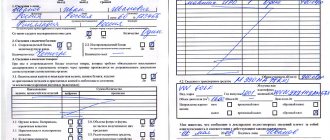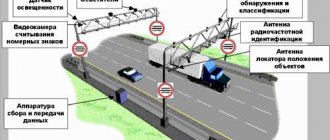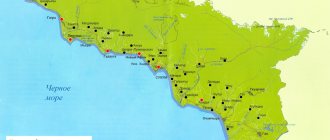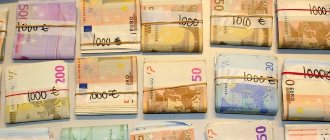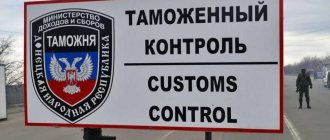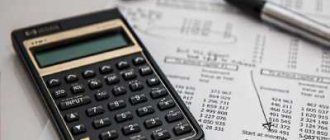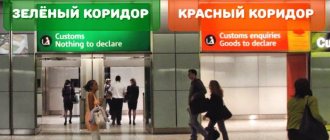- 4.2
Voted 5 times
4,205 votes
Write a review
The customs rules of Lithuania are practically no different from the requirements put forward by other countries. Violation of customs laws may result in a fine for smuggling.
Country Customs Regulations
There are 3 ways to get from Russia to the territory of the Republic of Lithuania: by car, by plane and by train.
According to the country’s customs rules, it is allowed to import into Lithuania by air:
- sports equipment (1 piece of equipment per person);
- equipment (mobile device, video camera, TV - 1 piece per person);
- camera (up to 2 pieces per person).
It is recommended to check the list of items carried in hand luggage in advance with your airline staff.
“US stranglehold on Lithuania’s neck”: Vilnius tried to maintain the transit of fertilizers
In mid-June, the Lithuanian presidential administration declared the position that the EU should not impose sanctions on Belarusian fertilizers, according to internal correspondence between the presidential office and the Ministry of Foreign Affairs published by the Delfi portal.
“The situation with sanctions against the Belarusian nuclear power plant is very bad, because they were late with the procedures. But in the case of fertilizers, we will first receive losses for our business, and then the Russians will take over the Belarusian enterprise. Let’s try to defend the interests of LT!” - says the quoted correspondence of the head of the group of presidential advisers on foreign policy, Asta Skysgirite .
“We do not seek to block all sectoral sanctions, we want only fertilizers to be excluded, the Belarusian Nuclear Power Plant to be on the list,” writes someone under the name Skirmante.
According to the portal, this is an adviser from the President's foreign policy group, Skirmante Strigene .
A few days after the correspondence, presidential adviser Darius Kulesius publicly stated that the country's leader Gitanas Nausėda would support the EU agreement on sectoral sanctions against Belarus, regardless of whether it applies to fertilizer exports or not.
In a response sent to the publication, the presidential administration emphasized that fragments of internal work correspondence do not reflect the final common position agreed upon with the government.
The Lithuanian Foreign Ministry does not comment on the information. The correspondence took place during the European Union’s decision to ban the import of petroleum products and potash fertilizers from Belarus. The EU eventually decided to impose sanctions on some products, but not on existing treaties.
When US sanctions against Belaruskali came into force, the transit of fertilizers through the country did not stop, since the company made an advance payment for transportation to Lithuanian Railways in November.
The Lithuanian government has stated that it intends to terminate the agreement between LZhD and Belaruskali after the sanctions come into force, although it assures fellow citizens that US economic measures do not directly apply to the transit of fertilizers in Lithuania.
In connection with the current situation, the Ministers of Foreign Affairs and Transport Gabrielius Landsbergis and Marius Skuodis wrote letters of resignation, saying that Lithuania had suffered serious reputational damage.
This is how they are, proud officials and ministers from post-Soviet republics. Everyone is trying to fit on two chairs and eat the fish. But it is not always possible to please Washington’s bosses and “make money” on trade relations with rebellious Belarus.
Hence the resignation letters, the embarrassment in front of fellow citizens, and the tight economic noose around the neck. Serves you right, collaborators.
Norms for importing goods and products without declaration
In 2021, the norms for the import of goods and products are as follows:
- tea - 100 grams;
- alcoholic drinks - 1,000 ml (alcohol concentration - 22%);
- strong alcoholic beverages - up to 2 liters;
- coffee - 500 grams;
- wine - 4,000 ml;
- eau de toilette - 250 ml;
- beer - 16,000 ml;
- perfume - 50 ml;
- cigarettes (the norm for traveling by car is 40 pieces, by plane - 200 pieces); You can also bring cigars (10 pieces) or tobacco - 50 grams).
There is no need to declare money if the total amount does not exceed 10 thousand euros.
Customs
Import rules:
Free import for passengers arriving with goods purchased within the EU intended for personal use only: 1. Tobacco products: – 800 cigarettes; – 400 cigarillos (max. 3 grams each); – 200 cigars; – 1 kilogram of smoking tobacco. 2. Alcoholic drinks: – 10 liters of alcohol over 22%; – 20 liters of alcoholic beverages less than 22%; – 90 liters of wine (although no more than 60 liters of sparkling wine); – 110 liters of beer.
Free import for passengers arriving from non-EU countries (including the Canary Islands, Channel Islands and other similar territories): 1. tobacco products, for passengers aged 17 years and over: – 200 cigarettes; or – 100 cigarillos (max. 3 grams each); or – 50 cigars; or – 250 g of smoking tobacco; or – a proportional mixture of these products; 2. alcoholic drinks for passengers aged 17 years and older: – 1 liter of alcohol with a volume of more than 22% or undenatured ethyl alcohol with a volume of more than 80%; or – 2 liters of spirits or aperitifs of wine or similar drinks with a volume of less than 22% or sparkling or liquor products; or – a proportional mixture of these products; and additionally – 4 liters of still wine; and also – 16 liters of beer; 3. medications for personal use; 4. other goods (for air passengers) with a total cost of 430 euros (per adult) or 150 euros (per passenger under 15 years of age).
Products of animal origin originating from countries other than EU Member States, Andorra, Liechtenstein, Norway, San Marino or Switzerland are not permitted for import into EU Member States, with the exception of limited quantities from Andorra, Faroe Islands, Greenland. Iceland and a small number of specific products from other countries.
For full information, please see or refer to the European Union website, https://europa.eu/.
For full information, please see Terms and Definitions, Section 5. Customs, or refer to the European Union website, https://europa.eu/.
Some plants and plant products entering the EU must have an original phytosanitary certificate (see www.ec.europa.eu/food/plant/plant_health_biosecurity). These items must be declared upon arrival and are subject to phytosanitary checks.
Rules on weapons and ammunition:
It is prohibited: 1. To import from any country not mentioned in paragraph 2 below, unless permits have been obtained from the Government or relevant ministries of Lithuania: - military weapons, police and military ammunition, other control or warning devices, training manuals for police officers; – hunting or sports rifles and weapons, ammunition, electrical equipment for fishing; 2. Import of weapons and ammunition from the Federal Reserve System of Russia. and Syria. For more information see https://sanctionsmap.eu/#/main/
Export rules:
Free export of imported duty free goods
Pets:
Cats and dogs are subject to Regulation (EC) No 998/2003 and Regulation (EC) 576/2013. Birds are subject to Decision (EC) No. 25/2007. For more information, contact your nearest Lithuanian embassy. Pets may enter as a passenger's checked baggage, in the cabin, or as cargo.
Baggage rules:
Baggage is processed at the first airport of entry or transit in Lithuania.
Exempted: baggage of passengers traveling further on the same flight, which is processed at the airport of the final destination in Lithuania.
Car and gasoline
You can import up to 10 liters of fuel into Lithuania. It is allowed to be transported in cans per vehicle.
If a car is imported into Lithuania, then customs clearance taxes are as follows:
- VAT 0% - an old car purchased in the European Union by a private owner from a private owner (all these conditions are mandatory);
- 10% duty on cars from other countries;
- VAT 21% - for new cars less than six months old from the date of first registration or with a mileage of less than 6,000 km;
- duty 0% - for residents of the European Union who enter by car, also purchased in the territory of the European Union;
- There are no excise taxes.
Rules for transporting dogs and other animals
The import of animals into the territory of Lithuania is permitted. Moreover, each animal must have a veterinary passport or certificate.
Having a microchip and being vaccinated against rabies is strictly required. This applies to both dogs and cats.
Living creatures protected by the CITES Convention cannot be imported into the territory of Lithuania.
Publicist Vinnikov: Lithuania has collided with the world economic axis
The official opening of a representative office of Taiwan is costing official Vilnius more and more. The hopes that everything would somehow, if not immediately, settle down and get better, not only disappeared like smoke - the situation in the Chinese direction is constantly getting worse.
Following the cessation of transit of goods made in China through the territory of Lithuania and the resetting of credit limits for Lithuanian enterprises in the PRC, this Baltic republic was “erased” from the Beijing trade map of the world, that is, a complete cessation of exports and imports. The losses from this Chinese boycott will amount to $300 million annually - a non-critical amount even for such a small country as Lithuania, but already quite noticeable. And the most unpleasant and unexpected factor for local politicians was the European Union’s refusal to at least partially compensate for the losses incurred for the sake of the Chinese Uyghurs and world democracy. The vaunted “European solidarity” again turned out to be very selective.
FBA "Economy Today" /
But this, as it turned out a little later, was just flowers. On the eve of the global “summit for democracy,” Beijing authorities warned major Western multinationals that if they continued to do business with Lithuania, they would not be able to do business with China. Comparing the one-and-a-half-billion-dollar Chinese market with the three-million-dollar Lithuanian market is, of course, nonsense, but fulfilling the “red dragon’s” ultimatum will create a very unpleasant precedent for the collective West, since, having conceded in small things, one will then have to concede in more and more.
Although by the time Taiwan's diplomatic mission opened in Vilnius, it was obvious that the American attack on China was fading, and the Lithuanians, to put it mildly, were spitting against the wind. And, apparently, this is a matter of national pride - after all, even on the issue of energy, over the last month they have managed to seriously strain their Baltic neighbors in the person of Latvia and Estonia, as well as Poland. In this regard, there is no point in even remembering the Ignalina Nuclear Power Plant, which was closed by the “wise men of Vilnius” with their own hands. And about “President Sveta” from neighboring Belarus, which has been supported by the Lithuanian budget for more than a year now. True, as a reward for their efforts, the Lithuanian side received the right to loans from the United States, having signed an agreement with the US Export-Import Bank for $600 million in direct loans plus $1 billion in guarantees, but this “right to debts” is a completely different matter.
But there is a clear reason and sense to think about China’s actions. I have already noted that when a representative office of Taipei, similar to the current Lithuanian one, opened in neighboring Latvia about 12 years ago, nothing similar was observed from official Beijing, as it is not observed now. But in Lithuania, the Chinese comrades are having a blast like they have never had before. What could be the matter here? Not only and not even so much in the openly provocative anti-Chinese rhetoric of Vilnius. The fact is that this rhetoric turned out to be an ideal touchstone to test the new global balance of power.
Federal News Agency /
If you look at the list of classical Chinese stratagems, it is not difficult to find one among them: “hit the grass to scare away the snake.” An approximate analogue in Russian: “they beat a cat - they give an example to the daughter-in-law.” Lithuania plays the role of the cat and, accordingly, the grass, and the European Union plays the role of the snake and, accordingly, the daughter-in-law. Trade with which is a key element of the Chinese economic breakthrough: the main profit comes to the “red dragon” from the American market, but without the European component this would be impossible.
In Covid 2021, China came out on top in the list of the EU's most important trading partners (586 billion euros), ahead of the United States (555 billion euros).
The volume of exports from “united Europe” to China increased by 2.2%, to 202.5 billion euros, imports from China - by 5.6%, to 383.5 billion euros. The plus in favor of Beijing amounted to 181 billion euros. At the same time, US-Chinese trade turnover at the end of 2021 increased by 8.3%, to $586.72 billion, exports from China to the United States increased by 7.9%, to $451.8 billion, imports - by 9.8% , up to $134.9 billion, plus in favor of Beijing amounted to $316.9 billion. Adjusted for the difference between the values of currencies (the exchange rate is above 1.1 dollars per euro), it is clear that the EU-China line is becoming the main economic axis of the modern world. The condition and functionality of which becomes the highest political priority. And Lithuania, perhaps without realizing it, has run into this axis. This article is solely the opinion of the author and may not coincide with the position of the editors.
Import of medicines and medical supplies
If a person plans to take medications with him on the road, he should first consult his doctor. Every psychotropic or narcotic drug must be justified by an official prescription.
In 2021, the rules for transporting medicines are as follows:
- all medications must be in their original packaging;
- psychotropic and narcotic drugs are allowed to be transported only for personal purposes;
- tranquilizers and antidepressants are allowed to be carried with you for 30 days (unauthorized prolongation of this period is considered a violation);
- You must have with you a certificate of the established form, which is issued by the hospital;
- You cannot carry more medicines than are indicated in the prescription or certificate.
If a traveler needs medications for a longer period, he must take care in advance to obtain a certificate from the attending physician. This certificate must contain detailed information about the disease itself and the prescribed treatment.
Customs regulations of Lithuania
Attention!!! Due to the coronavirus situation, there are restrictions on entry into Lithuania. The rules are constantly changing depending on the situation!!!
The new norm in the Republic of Lithuania came into force on May 1, 2015 . In accordance with it, tourists will be able to import fuel in the tank of a personal car no more than 3 times a month . The number of border crossings will be tied to the person, not the car.
If a tourist crosses the border with Lithuania for the fourth or more time, he will have to pay a lot. So, for example, if there are 10 liters of diesel fuel in the tank of a traveler’s car at the time of entry into Lithuania, the amount of fees (excise tax plus VAT) will be 4 euros, 20 liters - about 10 euros, 60 liters - about 25 euros.
If there are 10 liters of gasoline in the tank of a tourist’s car at the time of entry into Lithuania, the amount of fees (excise tax plus VAT) will be 6 euros, 20 liters - about 13 euros.
The Lithuanian side is introducing restrictions in order to combat the shadow economy. The requirements will affect not only residents of Belarus, but also tourists from other countries who often cross the border of Belarus and Lithuania. (Information from the site https://tourismnews.by)
WHAT CAN BE IMPORTED TO LITHUANIA WITHOUT CUSTOMS DUTIES AND OTHER TAXES
A traveler temporarily arriving in the Republic of Lithuania from third countries may import the following items without paying customs duties and taxes:
- personal items, including goods whose value does not exceed that indicated;
- vehicle for personal use;
- audio, video or data media, public information materials, professional equipment.
In other cases, a traveler arriving in the Republic of Lithuania from third countries may import without paying customs duties and taxes:
- personal property if a person changes his place of residence and moves to live in Lithuania from a third country;
- dowry, new (not new) household items belonging to him, if the person, in the event of marriage, moves to live in Lithuania from a third country; as well as gifts received on the occasion of marriage from persons residing in a third country with a value of up to 1000 euros;
- goods of a non-commercial nature contained in personal baggage (imported irregularly and intended for the personal use of travelers or members of their families or as gifts), if their total value (except for the limited goods specified below) does not exceed:
- 1480 litas when the passenger arrives by air or sea;
- 510 litas if the goods are imported by a passenger under 15 years of age; crew members of vehicles traveling on regular international routes to or from third countries; persons working and (or) living in a border zone with a third country*;
- 1030 litas if the goods are imported by other persons (including persons using an aircraft or sea vessel for personal needs).
* - border zone with a third country - a strip of land 15 kilometers wide from the border line of the Republic of Lithuania with a third country. Local governments, part of whose territory falls within this strip, are also considered part of the border zone with a third country.
LIMITED PRODUCTS
Without paying import duties and taxes, one passenger, at least 17 years of age, can import:
TOBACCO PRODUCTS
| Passengers arriving by air | Passengers arriving by other means of transport** | |
| Cigarettes | 200 pcs., or | 40 pcs., or |
| Cigarillos (cigars, the maximum weight of which is 3 grams each) | 100 pcs., or | 20 pcs., or |
| Cigar | 50 pcs., or | 10 pcs., or |
| Smoking tobacco | 250 gr. | 50 gr. |
- ** — passengers arriving not by air; persons using an aircraft or ship for personal needs; crew members of vehicles traveling on regular international routes to or from third countries; persons working and (or) living in a border area with a third country;
ALCOHOLIC DRINKS
| Passengers arriving by any type of transport | Crew members, workers and residents of the border zone *** | |
| Non-denatured ethyl alcohol, the concentration of which is at least 80 percent. | 1 liter, or | 0.5 liters, or |
| Ethyl alcohol and alcoholic beverages, the concentration of which is not less than 22 percent. | 1 liter, or | 0.5 liters, or |
| Ethyl alcohol and alcoholic beverages, the concentration of which does not exceed 22 percent. | 2 liters | 0.75 liters |
| Calm wines | 4 liters | 0.75 liters |
| Beer | 16 liters | 4 liters |
*** - crew members of vehicles traveling on regular international routes to or from third countries; persons working and (or) living in the border zone with a third country.
When calculating the non-taxable value, or establishing a non-taxable quantity, the value or quantity of one product is not broken down, that is, the entire product, the quantity or value of which exceeds the specified limits, is taxed.
ENGINE FUEL
Import duties and taxes do not apply to imported engine fuels and oils contained in the stationary fuel and oil containers of a personal road vehicle in which a person is traveling. In addition, a traveler may bring in no more than 10 liters of engine fuel per vehicle in portable containers.
CUSTOMS DUTIES AND TAXES
When importing large quantities of goods, customs duties, excise taxes and value added tax are applied. If the value of goods carried in the passenger's personal luggage and subject to customs duty does not exceed 700 euros, the customs duty is calculated using the standard customs duty rate of 2.5 percent. If this amount is exceeded, customs duties are calculated according to the customs duty tariff. The standard customs duty rate does not apply to tobacco products and alcoholic beverages.
FOOD PRODUCTS
The passenger is PROHIBITED from bringing meat and dairy products from third countries into the European Union in personal luggage. However, for personal use, small quantities of these products are allowed to be imported from Andorra, the Faroe Islands, Greenland, Iceland, Croatia, Liechtenstein, Norway, San Mariino and Switzerland.
A passenger is ALLOWED to import a limited amount of baby milk powder, baby food and food intended for medical purposes if:
- it does not need to be refrigerated before use;
- they are packaged products bearing a trademark intended for direct sale to the final consumer;
- their packaging is not damaged, unless they are being consumed right now.
A passenger may import meat and dairy products for personal consumption through EU-approved veterinary border posts only if:
- state veterinary services have received the necessary documents from the country from which he is traveling;
- upon arrival at the border veterinary point, declares all such goods and presents the available documents for veterinary inspection.
If the passenger does not comply with these rules, the food products will be confiscated and destroyed upon arrival at the border of the European Union. If a passenger does not declare that he is carrying such products, he may be fined or face criminal charges.
PLANTS AND THEIR PRODUCTS
Without phytosanitary documents, each individual is allowed to import into the Republic of Lithuania for his own needs (final consumption):
- up to 100 bags, but not more than 500 g of seeds;
- up to 500 g of bulbs, tubers;
- up to 20 kg of fruits and vegetables;
- up to 50 pcs. cut flowers;
- up to 10 pcs. potted flowers;
- up to 50 pcs. Seedling material (sprouts);
- up to 2 units packages, but not more than 50 liters, of plant substrate;
- up to 100 kg of grain.
More extensive information on the applicable requirements for the import of plants and their products from third countries can be found in the Regulations on phytosanitary control of plants, plant products and other objects imported into the territory of the Republic of Lithuania and the European Community, as well as those transported in transit, approved by order of the Minister of Agriculture and the Minister of Finance Republic of Lithuania No. 3D-171/1K-080 dated March 25, 2005
IF YOU NEED MEDICATION ON THE ROAD
Do you need medicine on the road? Check with your doctor. Include the prescription or a copy of it in your bag along with the medicine. Remember: Residents transporting narcotic or psychotropic medications across the border of the Republic of Lithuania (both arriving and departing) must comply with the following rules:
- carry narcotic or psychotropic medications only for personal use, for health care purposes;
- when traveling to a Schengen state, along with medications, you must have a certificate of the established form issued by a health care institution, and when traveling to a non-Schengen state, copies of prescriptions for transported medications (copies of these prescriptions do not need to be approved by the Ministry of Health);
- carry with you a certificate or prescription (copy of the prescription) only issued to the traveling person;
- do not carry more medicines than indicated in the certificate or prescription (its copy);
- when heading to a Schengen state, you can carry narcotic drugs for a period of no more than 30 days, and when heading to a non-Schengen state - for a period of no more than 15 days;
- psychotropic medications can be carried for a period of no more than 30 days;
- Medicines should be stored in their original packaging (the same in which they were purchased at the pharmacy).
If medications are needed for a longer course of treatment, we suggest taking with you a doctor’s certificate, written in the appropriate foreign language, about the disease and the prescribed treatment, so that you can contact doctors in a foreign country who will prescribe the necessary medications.
Narcotic medications are medications that contain the following substances: buprenophine, fentanyl, methadone, morphine, pethidine, tramadol.
Psychotropic medications are medications that contain the following substances: alprazomal, bromzepam, chlordiazepoxide, diazepam, estazolam, fenzepam, medazepam, midazolam, oxazepam, nitrazepam, pentazocine, temazepam, tetrazepam, triazolam, zolpidem.
- Website of the Lithuanian customs service.
- Holidays in Lithuania via the link...
Tax Free Zone
This system operates throughout the Schengen area. The algorithm of actions is as follows.
- Find the Global Blue Tax Free Shopping logo on the store display.
- Remit payment.
- Request a Tax Free Form tax refund receipt.
- Fill out all the fields (you must write strictly in block letters, in Latin letters).
- Before starting the registration process, go to the customs counter with a completed receipt (you should also have your international passport, all receipts and purchases with you).
- Wait for the completed form to be stamped.
- Go to the counter with the Global Blue logo.
- Present the stamped form.
- Receive a refund (money is issued in cash or transferred to a card - it all depends on personal wishes).
If the traveler is in a hurry, it is recommended to send the completed form along with the stamp by e-mail.
After this, the VAT refund is made to the credit card. The money received is the amount of VAT, taking into account the deduction of the administrative fee.
All purchases must be in original packaging. You cannot use them until you return home.
Also, you should not put purchases in a bag that you plan to check in as luggage - they will need to be shown to customs officials. In the absence of their confirmation, no refund will be made.
What interesting products can you bring home from Lithuania?
You can easily find exchange offices in Lithuania, but it is better to exchange money before entering this country.
If the purpose of the trip is shopping, then it is best to go during the sales season (June or December), when you can buy branded items at a discount of up to 80%.
You can bring home from Lithuania:
- clothes from your favorite brands (it is advisable to purchase them in Vilnius stores);
- clothes from Lithuanian manufacturers (recommended brand - Grizas);
- linen products (it is recommended to purchase sheets, pillows, clothes, bags, tablecloths, napkins);
- handmade woolen items - you can find them both on street stalls and in any tourist shop;
- handmade leather goods (you should look for them on street stalls or in Akropolis);
- natural decorative cosmetics (the recommended brand is Margarita; you can find cosmetics both in specialized stores and in supermarkets);
- amber products (lamps, boxes, figurines);
- glass decorations;
- ceramic products (it is advisable to purchase them in souvenir shops);
- Šakotis (traditional Lithuanian cake, you can buy it in any supermarket);
- chocolate (recommended and “Rue”);
- bread (it is recommended to take traditional Baltic bread with caraway seeds; the quality of this product is very high, it does not spoil within a week);
- sausages (you can find them at farmers' markets; the recommended manufacturer is Tarybine; it is advisable to take sausages with various additives, pig ears and the famous Lithuanian kindziukas);
- cheeses (recommended, “Rokiskio”, “Svalya”);
- handmade marmalade Obuolių sūris, also called apple cheese;
- tincture “Three nines”;
- beer (the best companies are Svyturys, Utenos, Kalnapilis);
- mead (national Lithuanian drink prepared with herbs or berries).
It is important to know!
Persons living in border areas are allowed to carry 2 times less alcohol and tobacco products than other tourists. This is due to the fact that the country's authorities are fighting the smuggling of alcohol-containing products and tobacco.
Cost of 1 pack of cigarettes in Europe:
- Belarus - 62–82 cents;
- Lithuania - 2–3 euros;
- Norway - 11 euros.
There is a great temptation to export more cigarettes and resell them profitably within the European Union. The quality of cigarettes produced in Belarus is highly valued in Europe. But it is necessary to remember the law.
Amounts of fines
In cases where the customs authorities consider that a person crossing the border violates the rules for the transportation of tobacco and alcoholic beverages by importing them illegally, sanctions in the form of a fine may be applied to him. Its size may vary and depend on:
- Amounts of transported alcohol/tobacco.
- Cost of goods.
- Other information, including whether this person was previously noticed in such actions or not.
Practice shows that the first time you can get off with a minimal fine or a warning. At the same time, the fine can reach 2.5% of the amount for tobacco products and 5% for alcohol-containing products. More serious volumes may be classified as smuggling. They entail much more significant sanctions, including criminal punishment. For more detailed and up-to-date information, you can go to the website of the Lithuanian customs. Unfortunately, there is no version in Russian yet, but all basic information and news are available in English.
